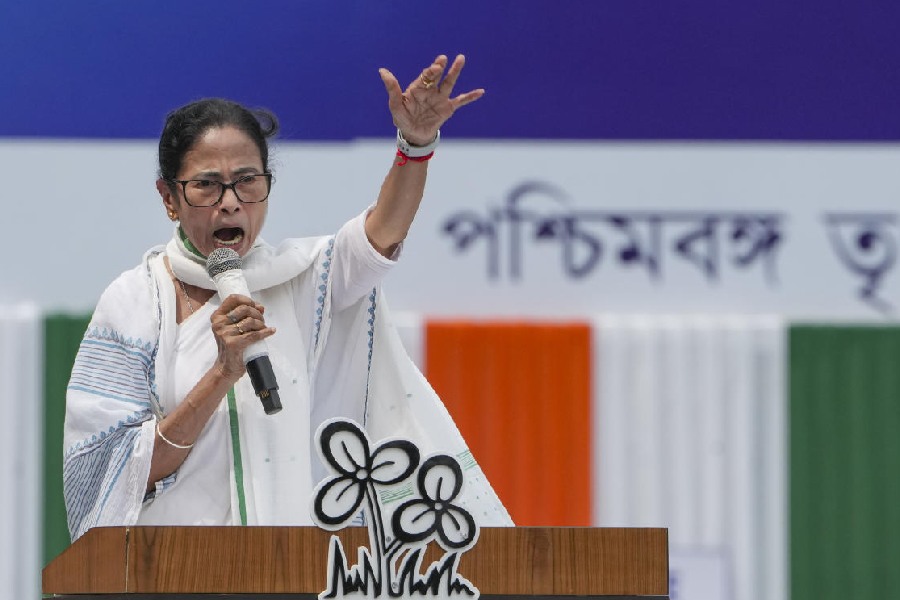Stop staring
Sir — Being subjected to stares can make a person uncomfortable. These days, members of Generation Z are using long, vacant expressions to react to any kind of social situation. Dubbed the ‘Gen Z stare’, the expression is being used in response to greetings or workplace queries, leaving the older generations flummoxed. It must be noted that Gen Z are digital natives who grew up with phones as an integral part of their lives. If only they could remove their gaze from screens and focus on having real conversations, they would have had a range of response mechanisms at their disposal.
Megha Dutta,
Noida
Strange claim
Sir — The Election Commission of India’s assertion before the Supreme Court that it is vested with the power of assessing citizenship is a blot on India’s democratic credentials (“Have the power to assess citizenship: EC tells SC”, July 23). According to the EC, Article 326 of the Constitution confers on the poll body the power to conduct elections and scrutinise whether a person fulfils the criteria for being a registered voter. Such an assertion comes against the backdrop of the nationwide uproar over the EC’s undertaking of the Special Intensive Revision in Bihar.
The EC’s stance on SIR aligns with the regime’s exploitative ploy to target marginalised voters. The fact that at least 52 lakh voters have been removed from the electoral list raises concerns over the legality of the exercise. The SIR appears to be the contentious National Registration of Citizens in disguise.
Aayman Anwar Ali,
Calcutta
Sir — Till now, it was known that the job of determining citizenship rested solely on the Union home ministry. The EC’s bold assertion before the highest court of the land that it, too, has the power to assess citizenship under Article 326 thus came as a surprise. The ongoing SIR of the electoral rolls in Bihar is aimed at disenfranchising marginalised voters.
The Central government is trying to implement NRC through the back door. In this context, it is imperative to consider that the Centre had strategically eliminated transparency in the appointment of election commissioners by excluding the chief justice of India from the selection panel. The EC is merely a tool in the hands of the government.
Jang Bahadur Singh,
Jamshedpur
Sir — By declaring that it has the power to assess citizenship, the EC has issued a strong statement to the apex court. Further, the EC argued that the list of documents contained in the enumeration forms is not conclusive and the decision to accept or reject a voter’s application is dependent on the satisfaction of poll officials. This does not help allay the fear that a vast number of voters from rural areas might be scrapped from the electoral roll.
Sukhendu Bhattacharjee,
Hooghly
Battle cry
Sir — No amount of praise is enough for the chief minister of West Bengal for taking the lead in protesting against the targeting of Bengali-speaking individuals in states ruled by the Bharatiya Janata Party (“Wounded pride”, July 22). Mamata Banerjee’s protest at the Martyrs’ Day rally against the “language terrorism” being inflicted on Bengalis is nothing short of a humanitarian initiative and should not be misconstrued as her new “political narrative”. To say that Banerjee is banking on “regionalism” as a “political arsenal” is misplaced.
Kajal Chatterjee,
Calcutta

Mamata Banerjee
Sir — I would say that Mamata Banerjee’s announcement of the Bengali language movement against the Bharatiya Janata Party’s “language terrorism” is not a call for upholding Bengali pride. Bengal has become a haven for immigrants and most of them happen to be Bengali-speaking Muslims. But the BJP-ruled states have started to weed out many Bengalis, citing them as ‘Bangladeshis’ without proper verification. Immigrants form a large chunk of the Trinamool Congress’s vote bank and it seems that the saffron party is targeting the TMC where it hurts the most.
Bhaskar Sanyal,
Hooghly
Diverse camp
Sir — The integrity of Indian army officials transcends the freedom of conscience enshrined in Article 25 of the Constitution (“Grey leniencies”, July 23). Recently, the Delhi High Court opined that commanding officers must prioritise collective unity while upholding the termination of an army officer who refused to participate in regimental religious parades, citing personal faith. Homogenised defence units are key to ensuring yeoman’s service from every official.
Prasun Kumar Dutta,
West Midnapore
Sir — “Grey leniences”, which discusses the implications of a Delhi High Court judgment upholding the dismissal of a Christian army officer, raises an important question: what comprises secularism? The army consists of people from varied castes, religions and creeds. Forceful visits to religious establishments cannot be touted as a mandatory activity to instil discipline in the army.
Asim Bandopadhyay,
Howrah










